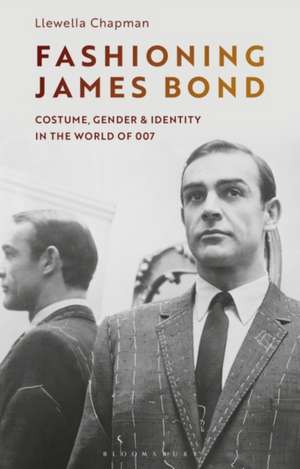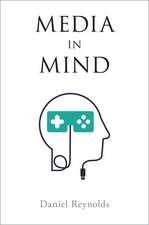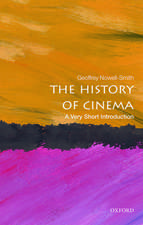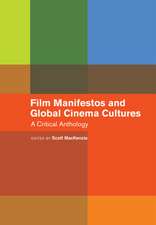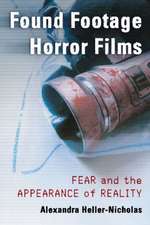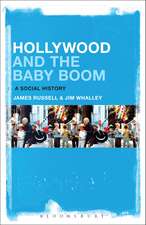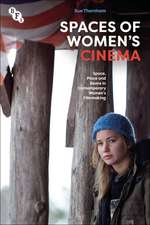Fashioning James Bond: Costume, Gender and Identity in the World of 007
Autor Llewella Chapmanen Limba Engleză Paperback – 20 oct 2021
| Toate formatele și edițiile | Preț | Express |
|---|---|---|
| Paperback (1) | 112.54 lei 3-5 săpt. | +99.33 lei 6-12 zile |
| Bloomsbury Publishing – 20 oct 2021 | 112.54 lei 3-5 săpt. | +99.33 lei 6-12 zile |
| Hardback (1) | 472.29 lei 3-5 săpt. | |
| Bloomsbury Publishing – 20 oct 2021 | 472.29 lei 3-5 săpt. |
Preț: 112.54 lei
Preț vechi: 190.08 lei
-41% Nou
Puncte Express: 169
Preț estimativ în valută:
21.54€ • 23.03$ • 17.96£
21.54€ • 23.03$ • 17.96£
Carte disponibilă
Livrare economică 28 martie-11 aprilie
Livrare express 13-19 martie pentru 109.32 lei
Preluare comenzi: 021 569.72.76
Specificații
ISBN-13: 9781350258488
ISBN-10: 1350258482
Pagini: 336
Ilustrații: 8 colour and 46 bw illus
Dimensiuni: 156 x 234 x 20 mm
Greutate: 0.57 kg
Editura: Bloomsbury Publishing
Colecția Bloomsbury Academic
Locul publicării:London, United Kingdom
ISBN-10: 1350258482
Pagini: 336
Ilustrații: 8 colour and 46 bw illus
Dimensiuni: 156 x 234 x 20 mm
Greutate: 0.57 kg
Editura: Bloomsbury Publishing
Colecția Bloomsbury Academic
Locul publicării:London, United Kingdom
Caracteristici
Draws on original archival research and interviews with costume designers, dressmakers and tailors and their families to provide insight into the creative process behind iconic Bond 'looks'
Notă biografică
Llewella Chapman is a visiting scholar at the University of East Anglia, UK. She has previously written on Hampton Court Palace, 1920s silent cinema, 1960s American runaway films and the film director Joseph Losey. Her research interests include British cinema, film history, fashion and costume, and gender.
Cuprins
Introduction1: 'My tailor. Savile Row': Sean Connery (1962)2: 'Fitting Fleming's hero': Sean Connery (1963-1967)3: The Man with the Midas touch: Lifestyle, fashion and marketing in the 1960s4: 'Coming out of Burton's short of credit': George Lazenby (1969)5: 'Provided the collars and the cuffs match': Sean Connery (1971)6: 'Licence to frill': Roger Moore (1971-1975)7: Breaking his tailor's heart: Roger Moore (1976-1980)8: 'You can always spot a Hayward': Roger Moore (1980-1985)9: Licence to tailor revoked: Timothy Dalton (1987-1989)10: Cool Brioni: Pierce Brosnan (1995-2002)11: Slick trigger suits: Daniel Craig (2005-2008)12.You travel with a tuxedo? Daniel Craig (2010 - 2015)ConclusionAppendixGlossary Bibliography Index
Recenzii
Intensely refreshing . This indispensable book opens up the closet on six decades of Bond clothing. Like Bond with his fashion choices, Dr Chapman bends the rules, refusing to confine herself to a single gender. For once, it's not merely the men's garments garnering all of the attention . a useful reference work for years to come - for men, women and those who are both, or neither.
A brilliantly researched survey that charts changing styles and examines how the Bond "look" influenced movie-goers' lifestyle aspirations and attracted brand placement, and how each 007 actor made those emblematic tuxedos their "own".
This book uncovers the ingenuity involved in creating the costumes in James Bond films. From design to performance, it provides a thorough and insightful study of the many ways in which key characters were dressed both to impress and to kill.
This thoroughly researched and original book offers a comprehensive look at the role of fashion as an essential part of the James Bond films from the early 1960s to today. It is engagingly written and shows how sartorial design and elements of mise-en-scène have contributed to the fictional world of the 007 and film production more generally. By contextualizing the use of fashion in the James Bond films, it raises important questions on how the specific choices during the production processes had a seismic effect on costume, gender and identity.
Fashioning James Bond provides a fascinating and comprehensive history of fashion in, and inspired by the James Bond Franchise. The book draws on thorough archival research and as such provides a unique insight into the process of costuming Bond - bringing together production studies, textual analysis and fashion history.
Llewella Chapman's Fashioning James Bond is an exciting contribution to Bond studies and beyond in its focus on the vital role played by costume and fashion in film with the accompanying questions of agency, labour and issues of gender that lie behind the image of the smartly tailored suits iconic to the franchise. Fashioning James Bond is meticulously assembled using its sources to give attention to the evolutions in 007's wardrobe and style. In this book Chapman gives us a wonderful historical account of how James Bond and also other characters in the films have been fashioned over the years, to provide detail on the costumes and those involved in bringing them to the screen. With this account Chapman reveals that if we look beneath the surface style and past the Savile Row mythology there is opportunity to closely examine an important part of the world of James Bond.
Like the fine detail on a GoldenEye Brioni suit, Oscar de le Renta gown from Licence to Kill or Angelo Vitucci piece from The Spy Who Loved Me, the glory of Chapman's project here is in the research stitching and the academic fabric of her execution . From anecdotes about the cutters of London's W1 to the tailoring wars, the boutique rivalries and the unwieldy eccentrics through to how a Bond actor walks into that world and the ideas bounce about again, this is a cracking study of what is more than brand identity and onscreen heroism.
A brilliantly researched survey that charts changing styles and examines how the Bond "look" influenced movie-goers' lifestyle aspirations and attracted brand placement, and how each 007 actor made those emblematic tuxedos their "own".
This book uncovers the ingenuity involved in creating the costumes in James Bond films. From design to performance, it provides a thorough and insightful study of the many ways in which key characters were dressed both to impress and to kill.
This thoroughly researched and original book offers a comprehensive look at the role of fashion as an essential part of the James Bond films from the early 1960s to today. It is engagingly written and shows how sartorial design and elements of mise-en-scène have contributed to the fictional world of the 007 and film production more generally. By contextualizing the use of fashion in the James Bond films, it raises important questions on how the specific choices during the production processes had a seismic effect on costume, gender and identity.
Fashioning James Bond provides a fascinating and comprehensive history of fashion in, and inspired by the James Bond Franchise. The book draws on thorough archival research and as such provides a unique insight into the process of costuming Bond - bringing together production studies, textual analysis and fashion history.
Llewella Chapman's Fashioning James Bond is an exciting contribution to Bond studies and beyond in its focus on the vital role played by costume and fashion in film with the accompanying questions of agency, labour and issues of gender that lie behind the image of the smartly tailored suits iconic to the franchise. Fashioning James Bond is meticulously assembled using its sources to give attention to the evolutions in 007's wardrobe and style. In this book Chapman gives us a wonderful historical account of how James Bond and also other characters in the films have been fashioned over the years, to provide detail on the costumes and those involved in bringing them to the screen. With this account Chapman reveals that if we look beneath the surface style and past the Savile Row mythology there is opportunity to closely examine an important part of the world of James Bond.
Like the fine detail on a GoldenEye Brioni suit, Oscar de le Renta gown from Licence to Kill or Angelo Vitucci piece from The Spy Who Loved Me, the glory of Chapman's project here is in the research stitching and the academic fabric of her execution . From anecdotes about the cutters of London's W1 to the tailoring wars, the boutique rivalries and the unwieldy eccentrics through to how a Bond actor walks into that world and the ideas bounce about again, this is a cracking study of what is more than brand identity and onscreen heroism.
